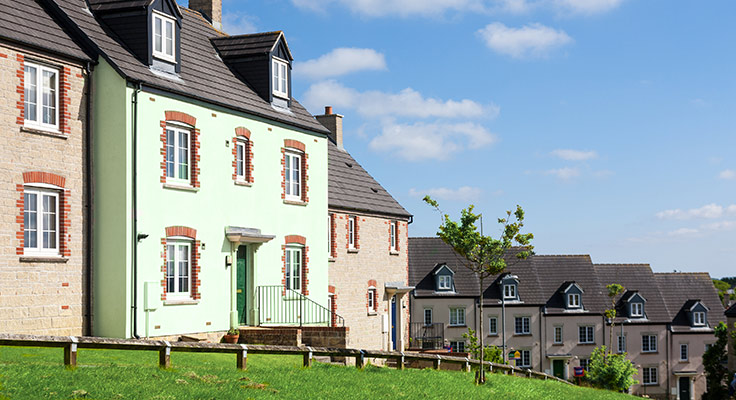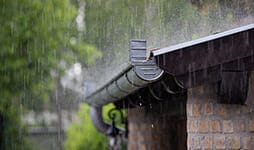From location to past claims, a whole range of factors make up your home insurance premium. They also impact the price you pay for it.
We’ve created this handy guide to break this all down, so you can be in the know.

What is the average cost of home insurance?
The cost of your home insurance will depend on several factors, including:
- Size, location and value of your home
- Age, condition and materials your house is built from
- Selected coverage options and excess
- Security systems
- Claims history and credit score
- Lifestyle (your age, number of children and pets)
In 2023, the average annual cost of home insurance with MORE THAN is:
- £103 for contents insurance*
- £158 for buildings insurance*
- £241 for a combined policy*
*Based on MORE THAN data from 1 January to 15 May 2023. Your premium will depend on your home and circumstances and will vary.
What affects your home insurance?
There are several factors that can impact your home insurance costs. We’ve outlined them below:
Your home
Some places are prone to flooding or subsidence. Others may have higher crime and vandalism rates. The more affluent postcodes can draw higher premiums. Research your area before buying and insuring a home. You can tailor your cover around any potential risks.
Property age
A listed building or an older property can be more costly to rebuild, which is why the insurance costs are usually higher.
Building Cost Information Service (BCIS) have a useful tool to calculate the rebuild costs of your home.
Materials
Homes made with fire-proof materials, like brick, tend to save more on their premiums. Those with timber frames or thatched roofs are more at risk of catching fire.
Pay attention to the materials your home is built with.
Where you live
Insurers can tell a lot just from your postcode, so it’s a good idea to check the local area before moving home. If you live in an area that is more prone to flooding or has higher levels of theft crime, this could affect the cost of your cover.
Crime levels
Insurers will look at the crime rates where you live to work out your premium price. The police publish the latest crime data for your area online. You can see the types of crimes being reported and what’s being done to tackle them.
Make your home as secure as possible to potentially reduce your premium.
Flood risk
Usually, a home closer to a body of water is more expensive to insure due to flood risks. Flood insurance is included under buildings insurance. Personal items should be covered by your contents insurance. Double check what your policy covers in terms of flooding.
The government website can help you determine the risk of floods occurring in your area:
- View the flooding history of a property in England to see if the home you wish to buy or insure has a history of flooding
- Check the long-term flood risk for an area in England, which may be especially useful if you live nearer the coast or a body of water
- Request the Environment Agency’s flood maps for England and Wales
You can also read our guide on home flooding for help finding the flood risk for your home.
If you spend long periods away from home
If you tend to spend longer away from your home, then this could increase your premium. Or it could result in requirements to check or reduce risk at your property. This is due to a higher risk of theft or damage if your home is unoccupied. For example, you could get burst pipe damage in cold weather if heating is not left on or pipes drained. Many insurers will also ask how secure your property is, including the type of locks you have fitted.
You may want to make use of smart technology to keep an eye on your property. Make sure your home is as secure as it can be to potentially reduce your premium price. Take a look at our guide to securing your home.
Value of your personal possessions
The value of the contents you want to insure impacts your home insurance premium. These include furniture, carpets, valuable jewellery, laptops, and clothing. If your contents are higher in value, you are likely to pay more.
It’s important you have the right level of cover, so check out our guide to calculating your contents for advice.
Previous claims
Your claims history is factored in too. People with fewer or no claims tend to pay less.
If you have made a claim in the past few years, you may end up paying more for your cover. This might not happen right away but on your renewal date.
Family and personal situation
You and your family’s personal situation are also considered. This includes factors such as your age, number of children and the amount of time you spend away from home.
Your age is key when working out your premium. Typically, older people tend to claim less than younger families or those with pets. New additions often mean an increase in possessions that may need to be covered.
There’s also the potential for unexpected accidents and damage to occur. Let your insurer know when anyone decides to move in or out, so you have the right cover.
Home insurance by property type
Your property type is an important factor when it comes to home insurance. Different types of homes have different needs.
For instance, a terraced house may have a lower insurance premium compared to a detached house. Terraced houses are often smaller and narrower and may cover a smaller square footage area. See our handy table below for some typical home insurance policy costs*:
Property type | Annual premium |
Terraced | £ 175 |
Detached | £ 260 |
Semi Detached | £ 185 |
* The table shows the average annual cost of combined buildings and contents insurance with MORE THAN between 1 January to 31 March 2023. Your premium cost will depend on the features of your own property and could be different.
Home insurance by number of bedrooms
The number of bedrooms your home has could impact the cost of your insurance. There are several factors around this, including:
- Size: more rooms would normally mean a bigger home, resulting in more square footage to cover
- Replacement cost: a house with more bedrooms could be more expensive to rebuild or repair. In the event of serious loss, such as a fire, expenses would be higher
- Occupancy: more bedrooms would usually mean more occupants. This raises the likelihood of accidents or liability claims
The table below shows some average home insurance premium costs with MORE THAN by the number of rooms in the property**:
No. of bedrooms | Annual premium |
1 | £102 |
2 | £131 |
3 | £183 |
4 | £258 |
5 | £352 |
6+ | £402 |
** The table shows the average annual cost of combined buildings and contents insurance with MORE THAN between 1 January to 31 March 2023. Your premium cost will depend on the features of your own property and could be different.
Home insurance for your needs
We can’t predict what will happen in the future, but we can make sure we’re prepared for all eventualities. Home insurance could help towards safeguarding your home.
Be prepared for the unexpected with the help of home insurance from MORE THAN.



